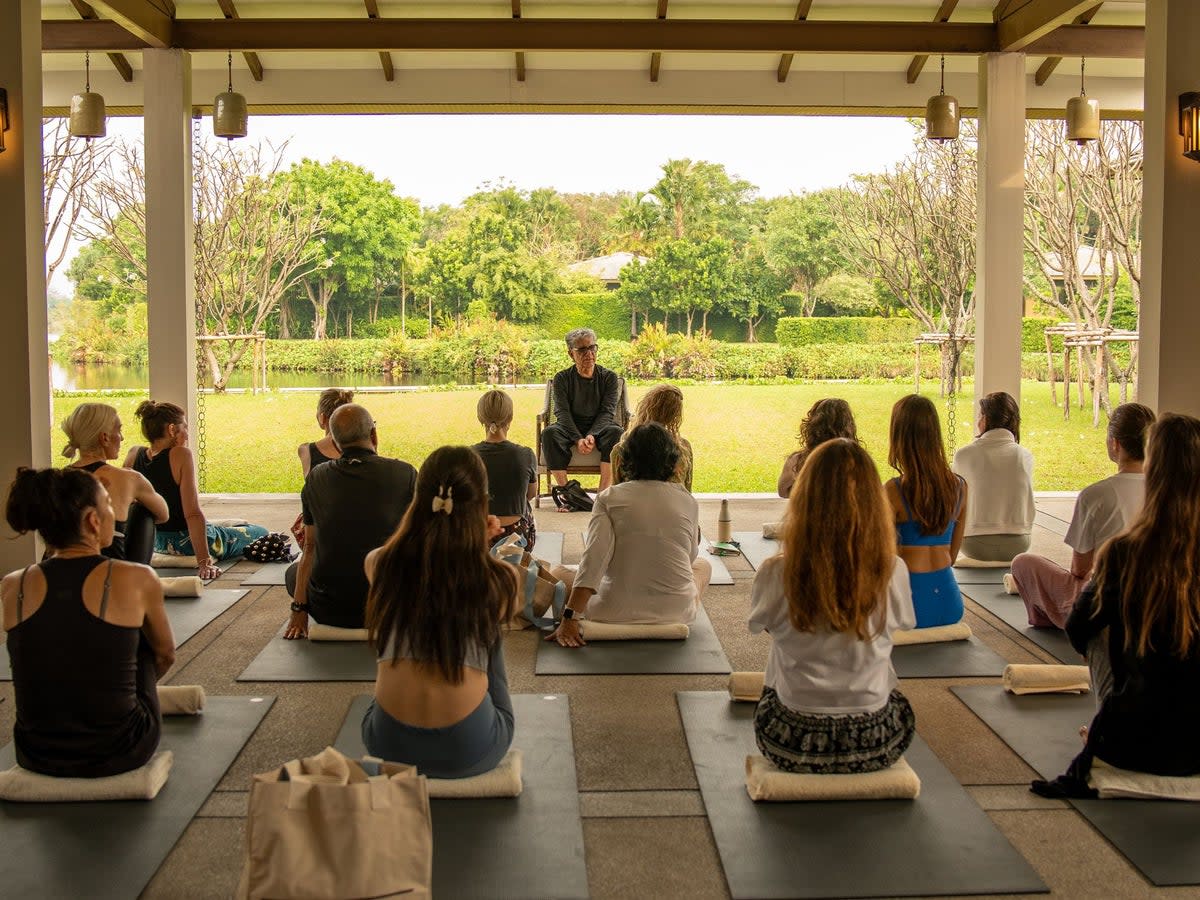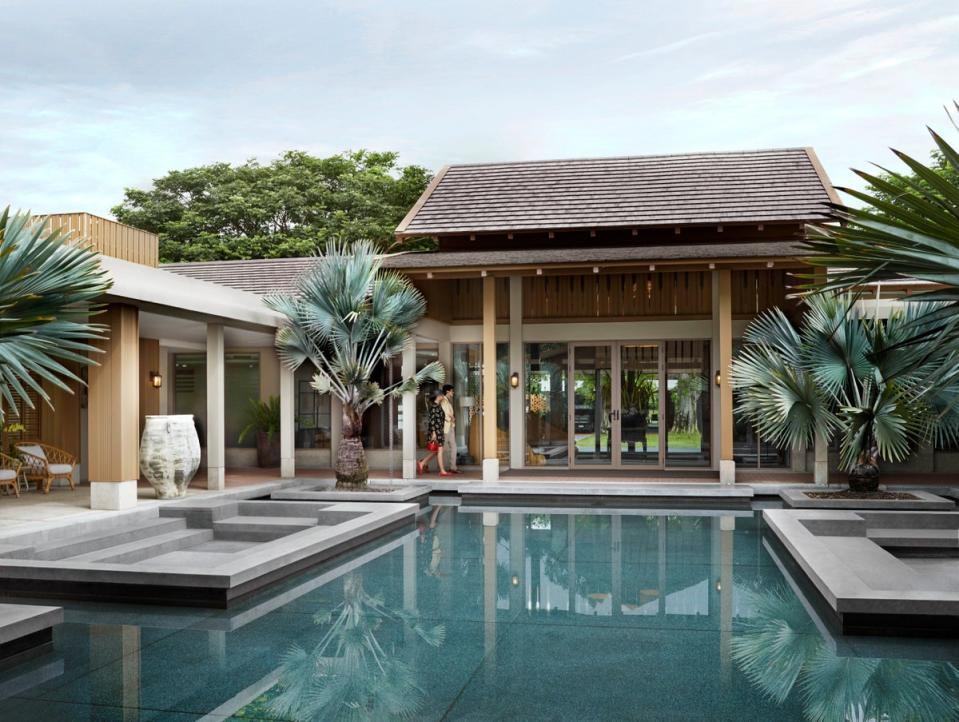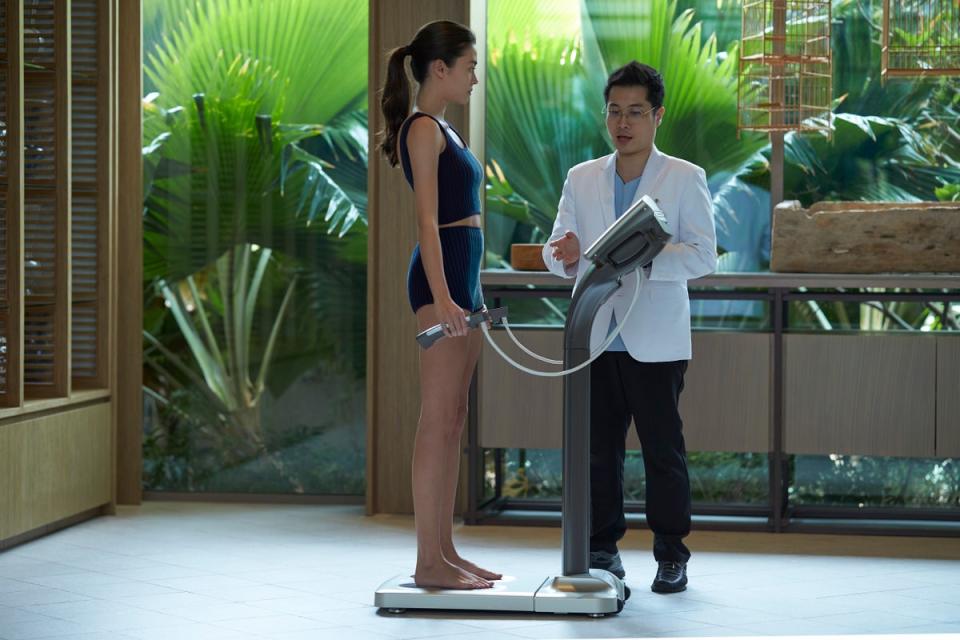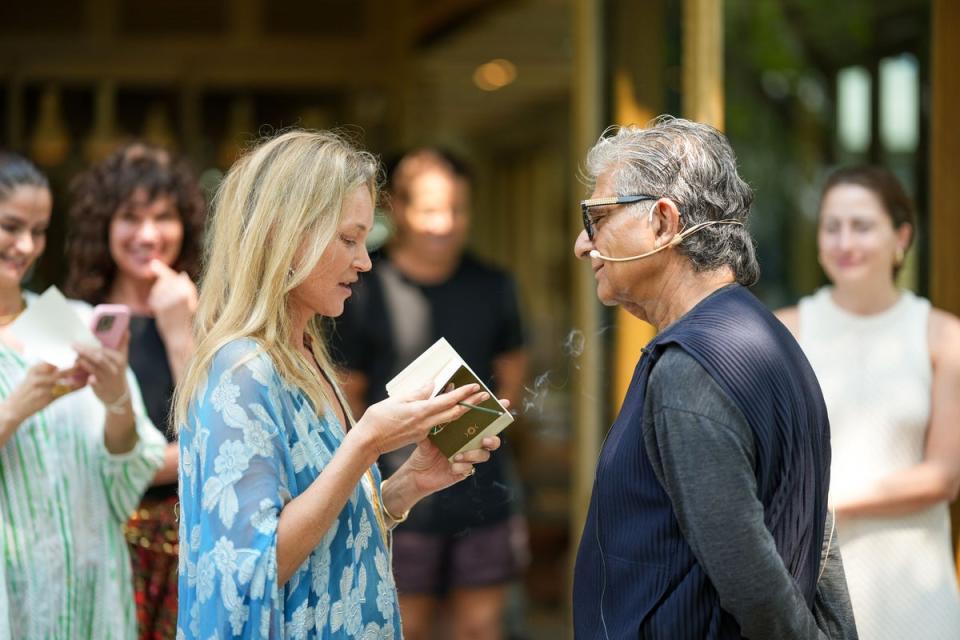Deepak Chopra's futuristic new retreat — is this the frontier of luxury wellness?

Deepak Chopra is sitting in the grounds of RAKxa, a wellness retreat just outside Bangkok, expounding on the virtues of AI, and especially how it can help with climate change, disease, health, emotional disorders, suicide prevention, depression, anxiety, social justice and even conflict resolution. To say he’s an advocate would be a massive understatement.
“We talk about the weaponization of AI, but we always have issues with technological development,” he says, wearing his Tom Ford glasses and two smart watches (neither tells the time — “the only time is now,” he’ll say, “but they measure my stress”) and talking in perfect paragraphs. “We had fire, the invention of the wheel, computers, email, everything. It’s part of our Darwinian principle. We have to adapt and during adaptation there is discomfort.
“I took a computer to my dad in India and showed him how to send emails. So, he goes on the computer and types it out and prints it and sends it to me in the post and says: ‘This is a great invention.’ It takes time.” Chopra, the sagacious Indian-American author and alternative medicine advocate, for decades a prominent figure in the New Age movement, is in Thailand to host a Life and Soul Longevity Retreat at the RAKxa Integrative Wellness resort, a luxury health farm devoted to mind, body and soul, or, alternatively, science, luxury and woo-woo.
It is an extraordinary place, and an indicator of where luxury wellness is going to take us over the next few years. The RAKxa experience involves personally tailored, cutting-edge diagnostics and bespoke treatment plans, health-span systems, advanced meditation techniques, and the kind of supercharged wellness stuff that has become bread and butter to top-end health resorts.
RAKxa is The White Lotus of integrative medicine and it’s rather brilliant. If you want to design a body and soul system for yourself, one that involves therapy, nutrition, rest and reflection, then this is the place to come. The pitch is simple: to help you define your own health goals and design your own personal wholeness journey — and it works. The list of activities and treatments would fill an encyclopaedia, let alone this sumptuous, isolated resort. It’s all here: extensive detoxification therapy, cryo, hyperbaric chamber therapy, traditional Thai massage, chakra balancing, meditation, tai chi, crystal healing, acupuncture, weight management, pranayama, zen na tai (an integrated healing technique), hydrotherapy, probiotic replacement therapy, the lot. For Chopra, who is a consultant to RAKxa, and who espouses the integrative method of treatment, it is a natural development of relaxation and healing.

“There is a complete holistic programme here, and it’s a centre where you have access to modern diagnostic technology,” he says. “They are building a knowledge and education base for these practices too, so you know when you combine education, expanded awareness, tech and holistic practices you have a complete medicine. People like to divide medicine into Western, allopathic, Eastern and I think that is unnecessary. Medicine is what works and if it works you use it. If I have pneumonia, no amount of meditation is going to get rid of the infection, so I need an antibiotic. But that’s not the case with everything. The levels of expertise here are very high, and I totally support the integrative approach. I think this could be a model for other places.”
One of the principles of RAKxa is a focus on longevity, which has become a kind of holy grail for those with the curiosity, the means and the motivation to explore further. Is longevity now the ultimate health goal?
“Well, we are one small planet and there are two trillion galaxies, so we take ourselves too seriously, but on the other hand people are living longer. There are now more 100-year-olds than ever before. But cognitive decline, Parkinson’s and all these other issues including the burden on society where we spend most of our money on the last few years of life, trapped in nursing homes, that doesn’t work. The idea of longevity should be replaced by a proper health span.
“If people are going to live longer, they might as well live healthier and be more productive and more respected by society. And there are cultures where that happens. So, we need to be preventative, and map out our futures, and with the help of AI I think we’ll be able to do that. We will start to know when we are going to get sick, so we will be able to prepare for it.
“Learning about how we experience time, and connect between our emotions, relationships and biological rhythms and the food we eat, it’s too much to compute for a single human. Future health will be very precise, personalised and predictive and participatory. It will address our existential conundrums of old age, infirmity, and ill health. Only humans fear death because they can imagine it, predict it. Animals don’t. We are conceptual beings, as everything we experience in a way are symbolic representations of our concepts of reality.”

Wellness and mindfulness are now both big businesses. Thirty years ago, top-end resorts were all chasing the Aman group — Amanpuri, Amanwana, Amankila etc. These were considered to be the very best resorts in the world, where you would expect the most exquisite bespoke experience in terms of location, service, privacy, food, amenities, everything. There were people who became Aman junkies, who would travel the world ticking them off. Then, as tastes changed, and rival brands caught up, we entered the spa era, where every hotel suddenly had to have a luxury spa experience (and not just a dopey masseuse who three weeks earlier had been a receptionist, and whose conversation usually began and ended with, “How’s the pressure for you?”). In the years since then, unless you had a state-of-the-art spa you could kiss goodbye to the entitled traveller (just look at the extraordinary new spa at Estelle Manor, for instance).
But now it’s all about mind, body and spirit. Hence, the advent of places like RAKxa, which is a supercharged, next-level health farm for people who would rather spend their days meditating, eating healthily, exercising, and monitoring their spiritual nutrition. As we start to develop a different relationship with ageing, and take even more care with our bodies, then places like this are going to thrive.
With Chopra’s help, the company behind RAKxa is opening similar resorts in Tuscany and in Aspen, and soon you can easily imagine people ticking them off in the same way a previous generation did with the Amans. Also, there is an acute sense of novelty about the place, which makes it perfect for a week’s stay.
There aren’t many places in the world where you can look forward to a programme that involves mindful exercises, energy healing, Ayurvedic massage and traditional Thai flaming detoxification, along with modern oxygen therapy and intravenous infusions of antioxidant-rich formulas to restore body functions at a cellular level. Honestly, if you want next level health farm vibes, this is the place to come.
“Both extreme wealth and extreme poverty are risk factors for disease,” says Chopra. “If you have wealth, it doesn’t necessarily create good health. Just look at affluent countries like the Middle East, where they have the highest rates of diabetes. The future of health is the way in which we democratise it ultimately. That will happen. Long ago in the US, I saw a CAT scan the size of this room, but now they are hand-held devices with more computing power than the MIT computer that sent men to the moon. So we need access to tech as it becomes more inexpensive, and we need education.”
Chopra himself is a fascinating man, a guru with a razor-sharp wit and a disarming way of dealing with whoever’s in front of him (friend, foe or fan).
He seems to spend his days whizzing around the world, speaking in public, raising funds for his foundation and his various charitable projects, writing books — the next one is on AI, unsurprisingly — and involving himself in worthy commercial projects like this one (he has also partnered with Kate Moss on her wellness brand Cosmoss). On top of all that he is involved in an especially progressive project in Bhutan, where the royal family has parcelled out a piece of land the size of Singapore where they want to create a kind of “mindfulness community”, called Gelephu. Chopra sees it as a prototype utopia.

“I think it will be a very important contribution to how we could create communities which are peaceful and that have access to tech, and which also don’t have the problems that we see right now,” he said, with a smile. A proper “international green city”, it will have a new airport (Bhutan’s second), “zero-emission” industries as well as sustainable infrastructure companies.
“This is an inflection point, a moment in history that is very important for us,” the Bhutanese king said a few months ago. “It will be an economic hub with proper digital infrastructure, but it will be based on a vision of a better place.”
If it feels anything like RAKxa, it will no doubt be a huge success.
For the next Life and Soul Longevity Retreat at RAKxa with Dr Deepak Chopra, visit rakxawellness.com


